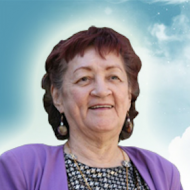

Alberta Daisy Schenck Adams
Alberta Schenck Adams, 81, died of congestive heart failure at Anaheim Memorial Hospital July 6, 2009 in Anaheim, California. She was blessed with longevity, a warrior spirit and a large extended family. Alberta Schenck, daughter of Mary Pushruk Schenck and Albert “Whitey” Schenck was born and raised in Nome, Alaska. Alberta is remembered for her pivotal role as a 16-year old, in the passage of Alaska’s Anti-Discrimination Act of 1945 when Alaska was a Territory. The Act prescribed penalties for racial discrimination in Alaska long before the Civil Rights movement took place in the rest of the nation.
Alberta has been honored by the Alaska Legislature for her activism as a young adult. In the spring of 1944 Alberta was working in Nome’s Dream Theater as an usher. She was fired from her position for expressing her opposition to the theatre’s Jim Crow policies which forbade Natives and “half-breeds” from sitting in the white’s only section. In an essay published in the March 3, 1944 edition of the Nome Nugget, Alberta expressed eloquently the sentiment echoed later in the civil rights movement of the 1950’s “I only truthfully know that I am one of God’s children regardless of race, color or creed.” Alberta went on to expose the practice of Jim Crow as counter to the spirit of the Declaration of Independence and the Constitution of the United States of America.
Shortly after the publication of Alberta’s essay she went to the same theatre with a white Army Sergeant and took a seat next to her date. She was ordered to move to the Native section of the theatre; when she refused she was forcibly evicted by the manager. Subsequently she attempted to buy a movie ticket but was confronted and removed. Alberta struggled but was taken by the police chief to the city jail. After her release and with the help of her father’s friend Major Marvin “Muktuk” Marston, Alberta sent a telegram to the Territorial Governor Ernest Gruening describing her story. Gruening offered Alberta his support for her fight against racism as did Territorial Senator O.D. Cochran. That April Alberta was overwhelmingly elected by the greater community of Nome as their “Queen of Nome” during the spring carnival.
Supported by her aunt, Frances Longley, and Frances’ partner, O.D. Cochran, this case was taken to the Territorial Legislature during the deliberations on the Anti-Discrimination Act. In January 1945 the Alaska Territorial Legislature convened in Juneau. During this session Representative Edward Anderson of Nome and Senator O.D. Cochran introduced legislation that would become the Alaska Anti-Discrimination Act. During the debate in both houses of the legislature, the injustice suffered by Alberta in the Dream Theatre was used as the “prime example” of prejudice and discrimination.
A portion of Alberta’s reality has been captured on a soon-to-be screened and released national one-hour PBS Special film, “For the Rights of All: Ending Jim Crow in Alaska,” a collaboration of Talking Circle Media, owned and operated by Alberta’s second-cousin, Jonathan Butzke, and the lead Production company, Blueberry Productions’ Jeffry Silverman.
Alberta is survived by her granddaughter Renee Bishop and grandson, Richard McKenna, and two great-grandchildren in Washington State, an extended network of cousins including: Gary T. Longley, Sr., Frances Butzke, MaryJean Longley, Nicholas Longley, Patricia Cochran and Ted Cavota and their children, grandchildren and great-grandchildren. She was preceded in death by her brother, Leonard, her daughters MaryJill and Yvonne Rose, her aunt Frances Cera Longley and cousins, Joan and Henry Longley.
Alberta’s ashes will be interred with her beloved Aunt Frances Longley and her cousin Henry at the Anchorage Memorial Park Cemetery on 535 E. 9th Avenue Friday, September 18, 2009 at 11:00 a.m.

